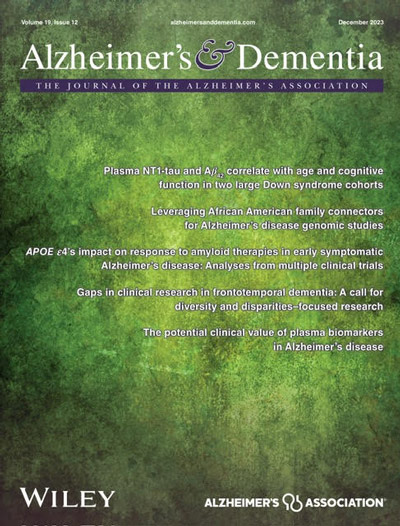Decoding adipose–brain crosstalk: Distinct lipid cargo in human adipose‐derived extracellular vesicles modulates amyloid aggregation in Alzheimer's disease
IF 11.1
1区 医学
Q1 CLINICAL NEUROLOGY
引用次数: 0
Abstract
INTRODUCTIONObesity is a major modifiable risk factor for Alzheimer's disease (AD), but the mechanistic link between peripheral metabolic dysfunction and AD progression remains unclear. Adipose‐derived extracellular vesicles (EVs) may penetrate the brain and alter lipid homeostasis, contributing to neurodegeneration.METHODSWe isolated exosome‐enriched EVs from subcutaneous and visceral fat of lean and obese individuals, followed by lipidomic profiling. An in vitro amyloid‐β (Aβ) aggregation assay using purified Aβ40 and Aβ42 peptides was performed under lipid environments mimicking physiological and pathological states.RESULTSObese‐derived EVs exhibited distinct lipid profiles, particularly in lysophosphatidylcholine (LPC) and sphingomyelin (SM) species. Functional assays demonstrated that lipid identity and concentration critically influenced Aβ aggregation kinetics.DISCUSSIONOur study reveals that obesity‐associated EV lipids modulate Aβ aggregation, linking adipose metabolism to AD pathology. These findings support lipid‐targeted strategies as potential therapeutics for neurodegenerative diseases.Highlights解码脂肪-脑串扰:人类脂肪来源的细胞外囊泡中不同的脂质货物调节阿尔茨海默病中的淀粉样蛋白聚集
肥胖是阿尔茨海默病(AD)的一个主要可改变的危险因素,但外周代谢功能障碍与AD进展之间的机制联系尚不清楚。脂肪来源的细胞外囊泡(EVs)可能穿透大脑,改变脂质稳态,导致神经变性。方法:我们从瘦子和肥胖者的皮下和内脏脂肪中分离出富含外泌体的ev,然后进行脂质组学分析。利用纯化的Aβ40和Aβ42肽在模拟生理和病理状态的脂质环境下进行体外淀粉样蛋白- β (Aβ)聚集实验。结果sobese衍生的ev表现出不同的脂质谱,特别是溶血磷脂酰胆碱(LPC)和鞘磷脂(SM)种。功能分析表明,脂质特性和浓度对Aβ聚集动力学有重要影响。我们的研究表明,肥胖相关的EV脂质调节Aβ聚集,将脂肪代谢与AD病理联系起来。这些发现支持脂质靶向策略作为神经退行性疾病的潜在治疗方法。来自肥胖个体的人类脂肪来源的细胞外囊泡(EVs)表现出独特的脂质组学特征。EV脂质以脂质类型和浓度依赖的方式调节淀粉样蛋白β (a β) 40和a β42的聚集。肥胖EVs中溶血磷脂酰胆碱(LPC)和鞘磷脂(SM)在体外显著调节Aβ成纤维。外周代谢状态与阿尔茨海默病淀粉样蛋白病理之间的联系
本文章由计算机程序翻译,如有差异,请以英文原文为准。
求助全文
约1分钟内获得全文
求助全文
来源期刊

Alzheimer's & Dementia
医学-临床神经学
CiteScore
14.50
自引率
5.00%
发文量
299
审稿时长
3 months
期刊介绍:
Alzheimer's & Dementia is a peer-reviewed journal that aims to bridge knowledge gaps in dementia research by covering the entire spectrum, from basic science to clinical trials to social and behavioral investigations. It provides a platform for rapid communication of new findings and ideas, optimal translation of research into practical applications, increasing knowledge across diverse disciplines for early detection, diagnosis, and intervention, and identifying promising new research directions. In July 2008, Alzheimer's & Dementia was accepted for indexing by MEDLINE, recognizing its scientific merit and contribution to Alzheimer's research.
 求助内容:
求助内容: 应助结果提醒方式:
应助结果提醒方式:


